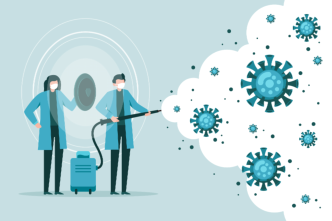
December 9, 2023, 3:03 pm
In the ever-evolving landscape of healthcare, infection control has become an increasingly critical aspect of dental practice management. The role of a dental office infection control coordinator is instrumental in ensuring that rigorous protocols are in place to safeguard the health of both patients and dental team members. In this blog post, we'll delve into the importance of having a dedicated infection control coordinator in a dental office and the vital responsibilities they undertake.
Compliance with Regulatory Standards:
Dental practices are subject to strict regulatory standards governing infection control and prevention. An infection control coordinator is responsible for staying abreast of these regulations, ensuring that the dental office complies with guidelines set forth by organizations such as the Centers for Disease Control and Prevention (CDC), the Occupational Safety and Health Administration (OSHA), and relevant state health departments. Compliance is not only a legal requirement but also a fundamental aspect of providing safe and effective patient care.
Implementation and Oversight of Protocols:
Developing and implementing infection control protocols is a multifaceted task that requires careful planning and execution. The infection control coordinator plays a central role in creating comprehensive protocols tailored to the specific needs of the dental practice. This includes procedures for sterilization, disinfection, hand hygiene, and the proper handling of infectious materials. Moreover, the coordinator oversees the consistent implementation of these protocols across all aspects of the practice.
Staff Training and Education:
An informed and well-trained dental team is a cornerstone of effective infection control. The infection control coordinator is responsible for organizing regular training sessions to educate dental staff about the latest guidelines, protocols, and best practices in infection control. This proactive approach ensures that all team members are knowledgeable and equipped to maintain a safe and hygienic environment.
Monitoring and Auditing Procedures:
Regular monitoring and auditing of infection control procedures are essential for identifying areas that may need improvement. The infection control coordinator conducts routine inspections, assesses adherence to protocols, and identifies opportunities for enhancement. This proactive approach helps mitigate potential risks and ensures that the dental practice maintains the highest standards of infection prevention.
Coordination with External Agencies:
In the event of an infectious disease outbreak or public health concern, the infection control coordinator collaborates with external agencies and health authorities. This includes reporting and responding to infectious disease incidents in accordance with local health regulations. Effective coordination ensures that the dental practice aligns with broader public health efforts and contributes to community well-being.
Equipment Maintenance and Sterilization:
Proper maintenance and sterilization of dental instruments and equipment are critical components of infection control. The infection control coordinator oversees the sterilization process, ensures that equipment is regularly maintained, and verifies that sterilization monitoring procedures are consistently followed. This meticulous approach safeguards both patients and dental team members from the risk of cross-contamination.
Communication with Patients:
Clear and transparent communication with patients regarding infection control measures builds trust and confidence. The infection control coordinator is often involved in developing patient communication materials that explain the practice's commitment to safety and the steps taken to prevent the spread of infections. This communication is particularly crucial in fostering a positive patient experience and addressing any concerns related to infection control.
In the complex and dynamic realm of dental healthcare, the role of a dental office infection control coordinator is indispensable. From ensuring regulatory compliance and implementing rigorous protocols to training staff, monitoring procedures, and coordinating with external agencies, the infection control coordinator is a linchpin in maintaining a safe and hygienic environment. By prioritizing infection control, dental practices not only adhere to legal requirements but also demonstrate a commitment to patient safety and the highest standards of care.
